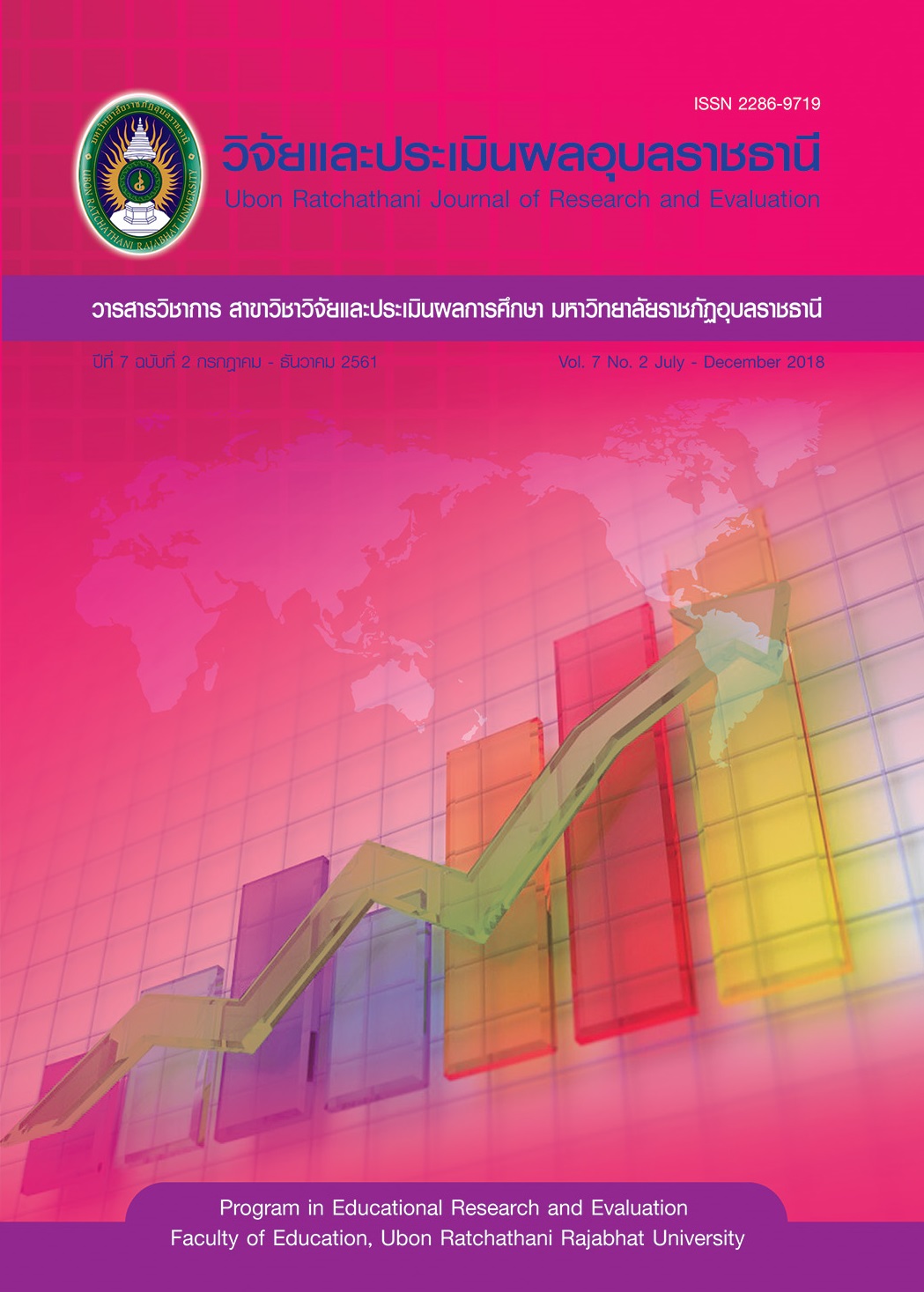Development of Mathematics Learning Activities for Matthayom Suksa 1 Students Using Formative Assessment Process
Keywords:
Formative assessment, Mathematical learning activities, learning behaviorsAbstract
The purposes of this research were 1) to create Mathematics Learning Activities for Matthayom Suksa 1 Students using Formative Assessment Process 2) to experiment and analyze the result of Mathematic Learning Activities and 3) to analyze teacher and students behavior during using the Mathematics Learning Activities. Samples are 33 Students of Matthayom Suksa 1. The instruments used in this research include test, questionnaire, observation form, interview, and video recording. Data analyses was done by using means, standard deviations as well as content analysis.
The research findings were as follows:
1. The mathematics learning activities for Matthayom Suksa Students 1 were 0.85 content validity index, and good appropriateness ( =3.38).These learning activities were appropriate to implement in classroom.
2. The teacher gave the feedback to entire learning activities. Then it to help students to achieve their learning goals. Thus, this process could help students to get better mathematical knowledge, and good attitude toward math learning.
3. Teaching and learning behavior between teacher and students were active; teacher as a coach, which help encourage students to take real action. Teacher teaching and students learning were active behavior. There were teacher as a coach and students as coach in real situation. These students well done authentic performance by themself.
References
Chiangkhun, V. Thai Education 2557/2558: How to Reform the Thai Education to the World in the 21st Century. Bangkok: Pimdeekarnpim, 2016. [in Thai]
Edmonds, W. Alex and Thomas D. Kennedy. An Applied Guide to Research Designs: Quantitative, Qualitative, and Mixed Methods. California: Sage Publications, 2017.
Hanmontri, S. et al. “Course Outline for Capacity Development of Children in the Future (2015-2034),” Research Methodology & Cognitive Science. 13,2 (2015): 1-13. [In Thai]
Havnes, Anton, et al. "Formative Assessment and Feedback: Making Learning Visible,” Studies in Educational Evaluation 38,1 (2012): 21-27.
Kanjanawasee, S. Traditional Test Theory. 7nd ed. Bangkok: Chulalongkorn University Printing House, 2013. [in Thai]
Panpurk S. Development of Measurement and Evaluation Competencies. Bangkok: National Institute Educational Testing Service (Public Organization), 2014. [in Thai]
Phijit, N. and K. Nournpeang. “Learning Management Focused on Building Self-knowledge to Develop Ability to Solve Math Problems for Matthayom Suksa 5 Students,” Research Methodology & Cognitive Science 12,2 (2015): 101-108. [in Thai]
Polit, D. F., T. Beck, and S. V. Owen. "Focus on research methods is the CVI an acceptable indicator of content validity." Res Nurs Health 30 (2007): 459-467.
Rithjaroon, P. “Assessment for Learning Development,” Sukhothai Thammathirat Open University, 9,1 (2016): 1-17. [in Thai]
Thongmaen, R., S. Kronphetpanee and P. Pradujprom. “Designing Classroom Learning Activity by Implementing a Formative Assessment Process for Primary School Students,” Research Methodology & Cognitive Science, 15,2 (2018): 133-146. [in Thai]
Watkins, David and John Hattie. "Multiple Goals in a Hong Kong Chinese Educational Context: An Investigation of Developmental Trends and Learning Outcomes,” Australian Journal of Education 56,3 (2012): 273-286.
Downloads
Published
How to Cite
Issue
Section
License
1. บทความที่ตีพิมพ์ในวารสารนี้ได้มีการตรวจสอบการลอกเลียนงานวรรณกรรมแล้ว ไม่เกินร้อยละ 25
2. บทความที่ตีพิมพ์ในวารสารนี้เป็นข้อคิดเห็น ข้อค้นพบของผู้เขียนบทความ โดยผู้เขียนบทความต้องเป็นผู้รับผิดชอบต่อผลทางกฎหมายใด ๆ ที่อาจเกิดขึ้นจากบทความนั้น ๆ
3. บทความ ข้อมูล เนื้อหา รูปภาพ ฯลฯ ที่ได้รับการตีพิมพ์ในวารสารวิจัยและประเมินผลอุบลราชธานี ถือเป็นลิขสิทธิ์ของวารสารวิจัยและประเมินผลอุบลราชธานี หากบุคคลหรือหน่วยงานใดต้องการนำทั้งหมดไปเผยแพร่ต่อหรือเพื่อกระทำการใดๆ จะต้องได้รับอนุญาตเป็นลายลักษณ์อักษรจากวารสารวิจัยและประเมินผลอุบลราชธานีก่อนเท่านั้น และจะต้องมีการอ้างอิงวารสารวิจัยและประเมินผลอุบลราชธานี ฉบับนั้น ๆ ด้วย






